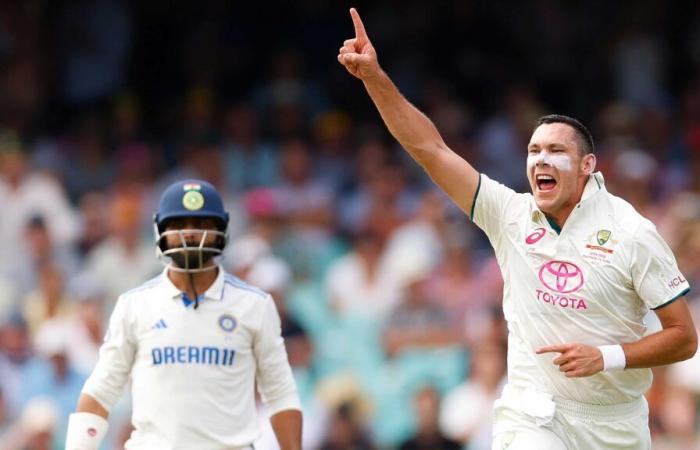When Scott Boland made his famous Test debut at the MCG three summers ago, Australia thought they were picking a workhorse seamer who could shoulder a sizeable bowling load on a traditionally flat Melbourne Test pitch.
“The first thing you’ve got to wrap your head around playing at the MCG is you’ll have to bowl a lot of overs more often than not – and he does that really well,” captain Pat Cummins said when explaining Boland’s selection before the 2021 Boxing Day Ashes Test.
Now 13 Tests into Boland’s career, it is clear Australia have ended up with more than they bargained for. By the numbers, there has never been a better impact bowler on these shores in Test history.
After his latest act of devastation on a touring top-order – a first-innings haul of 4-30 in which almost half his 20 overs were maidens – Boland’s strike-rate in Tests played in Australia stands at 33.4, a full over better than the next lowest mark by a home-side bowler (James Pattinson’s 40.1).
Boland’s career is increasingly mirroring the one had by Adam Voges, another Sheffield Shield veteran who finally got a Baggy Green in his 30s and remains something of a statistical outlier.
But where Voges was dropped with a Test batting average second only to Sir Donald Bradman’s, Boland’s extraordinary bowling numbers – tipped by most to regress to a less anomalous mean over time – if anything are becoming more impressive.
Nitish Kumar Reddy’s dismissal marked Boland’s 50th Test wicket. Of bowlers to have reached that milestone, none in the past 60 years have taken their wickets at a lower average than Boland’s current mark of 18.88.
Bumrah (19.36) is one of the few current players in the same ballpark by that measure. The Indian spearhead’s late day-one strike on Usman Khawaja also saw him lower his strike-rate in Australia below 40, putting him as the only bowler within spitting distance of Boland.
Boland’s Test career has neatly coincided with a significant change in the character of Australian Test pitches, which have become increasingly seam-friendly. A change to the firmness of the Kookaburra ball’s seam hasn’t hurt either.
His reputation as a workhorse remains, as long-time Sheffield Shield adversary Beau Webster noted at stumps on day one. But Boland has shown himself to be so much more.
“He’s a difficult customer Scotty. He’s had the wood over us in Tassie for a long time,” said Tasmanian debutant Webster.
“If there’s anything in the wicket, he finds it, and if there’s nothing, he finds a way through. He’s been fantastic this whole series when he’s got his chance. He’s relentless.
“His line and his length and his natural angle makes it really hard for right-handers. When we see him go around the wicket to left-handers, it’s impressive stuff.
“It was great to watch from third slip today – just the amount of movement he gets, just how accurate he is, how challenging he is for both left and right handers.
“He’s been superb and he can bowl long spells and back up the next day. He’s just one of those guys who can keep going.
“He’s a ripping bloke so everyone’s really stoked whenever he does well, which seems to be all the time at the moment.”
India’s first dig was only the fourth time Boland has been asked to bowl 20 overs or more in a Test innings. Australia’s recent triumph in Melbourne was the first time he sent down more than 40 in a Test.
Batters have a hard time sizing him up early on. He could quite conceivably have had three of India’s top seven out on their first ball on Friday, maintaining a trend of his career that has seen him threaten consistently with his first over of a spell.
Despite his prolific Test run, it is a quirk that his only five-wicket haul remains that debut return of 6-7 against England. The Victorian was given every chance to change that when Cummins brought him back on with a fragile final trio of seamers to bowl at.
Cummins and Mitchell Starc were the ones to mop the tail instead. It only served to enhance Boland’s reputation as a big-game hunter; his four first-innings victims sit first (Yashasvi Jaiswal), second (Reddy), fourth (Rishabh Pant), and fifth (Virat Kohli) among India’s leading run-getters for the tour. He would have had No.6 on that list too (Ravindra Jadeja) had Steve Smith not fluffed a waist-high catch at second slip during the second session.
Boland’s hold over Kohli has become a trump card for the Aussies. The right-armer found his edge first ball – and would have had his wicket had a line-ball review gone Australia’s way – before allowing only three scoring shots from 25 deliveries to him.
When Kohli nicked another, another prod that was a carbon copy of the earlier edge, Boland dismissed him for the fourth time in Tests and lowered his overall bowling average to star No.4 to eight.
After dismissing Pant (for a team-high 40 off 98) and Reddy (golden duck) in consecutive balls, he went close to completing a hat-trick when Jadeja almost edged his first ball too.
The major challenge Boland has had to contend during his ascension has been when batters have attacked him, most notably during his pair of Tests on the 2023 Ashes tour when his two wickets cost him 115.50 apiece.
It is a blueprint India clearly sought to emulate in this series, at least initially. Whether due to the more favourable bowling conditions in Australia than the UK, or because he has upped his game in the face of the hurdle, the visitors’ efforts to undermine him through naked aggression have not been as successful as England’s.
Pant took the long handle to Boland in Adelaide, blazing five boundaries off him in a doomed second-innings at an overall strike-rate of 135.3 against him. His efforts to repeat that have since failed in Melbourne (caught at deep third man attempting to lap him for six) and now Sydney (caught at mid-on trying to pull him).
The respect gained from Pant, India’s most dangerous batter, may be a warning to England ahead of next summer’s Ashes series when the Bazballers are certain to target Boland with similar tactics.
“I think he’s been an amazing bowler, especially the way he bowls line and length,” Pant said at stumps.
“Because he’s so used to these conditions. You don’t feel like he’s playing his first initial matches, you feel like he’s been there for a long period of time. That’s the experience he has playing in Australia.
“As an international cricketer you should be able to find ways to (score) each and every day, even if the bowler is bowling good, you should be able to keep finding ways.
“All respect to him, amazing bowler – but we’ve got to keep finding ways to tackle him.”
Pant is not the only one searching for answers against him.
NRMA Insurance Men’s Test Series v India
First Test: India won by 295 runs
Second Test: Australia won by 10 wickets
Third Test: Match drawn
Fourth Test: Australia won by 184 runs
Fifth Test: January 3-7: SCG, Sydney, 10.30am AEDT
Australia squad: Pat Cummins (c), Sean Abbott, Scott Boland, Alex Carey, Travis Head (vc), Usman Khawaja, Sam Konstas, Marnus Labuschagne, Nathan Lyon, Mitchell Marsh, Jhye Richardson, Steve Smith (vc), Mitchell Starc, Beau Webster
India squad: Rohit Sharma (c), Jasprit Bumrah (vc), Yashasvi Jaiswal, KL Rahul, Abhimanyu Easwaran, Devdutt Padikkal, Shubman Gill, Virat Kohli, Rishabh Pant, Sarfaraz Khan, Dhruv Jurel, Ravichandran Ashwin, Ravindra Jadeja, Mohammed Siraj, Akash Deep , Prasidh Krishna, Harshit Rana, Nitish Kumar Reddy, Washington Sundar. Reserves: Mukesh Kumar, Navdeep Saini, Khaleel Ahmed, Yash Dayal






